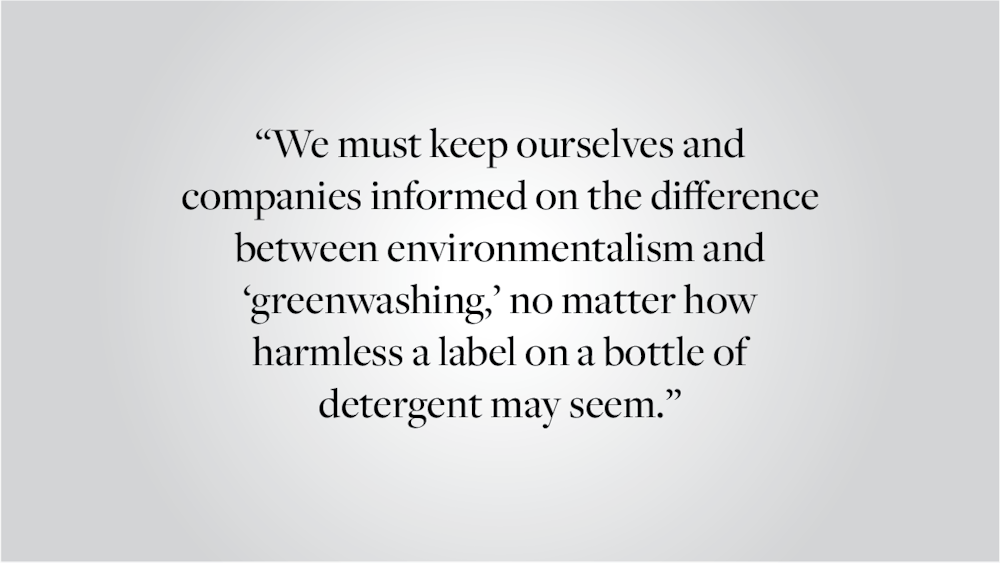On move-in day at Brown and college campuses across the world, millions of students race through superstores looking for dorm supplies. The items they purchase reflect the latest environmental trends. “Climate neutral certified,” one shirt promises. “Powered by plants,” a laundry detergent declares. Reusable cotton shopping bags are everywhere, and they’re so much better than plastic ones, right?
The “eco-fad” — a trend toward things that appear more environmentally friendly — has contributed to a greater sense of environmental awareness in the past decade. According to the 2021 Global Sustainability Study by Simon-Kucher & Partners, a consulting company, 63% of consumers have made “modest to significant shifts” towards sustainability in the past five years.
But like all fads, the environmental bandwagon has its pitfalls. The trendiness of environmentalism can allow individuals and corporations to disguise, consciously or not, their unsustainable behaviors in greener packaging, ultimately drawing attention away from effective long-term climate solutions.
Take cotton tote bags, for example. In the past decade, individuals and state legislatures in the United States denounced single-use plastic bags. What largely took their place were cotton tote bags — and lots of them. The reusable bags quickly became a means for individuals and companies to showcase their dedication to sustainability. Consumers were inundated with a surplus of fashionable cotton totes from grocery stores, bakeries and news outlets. Venetia Berry, an artist who was interviewed for a New York Times article about cotton tote bags, reported that she had “at least 25” in her closet.
The problem with overproducing these tote bags is that cotton takes a tremendous amount of water to manufacture — globally about 10,000 liters per kilogram of cotton. A 2018 study by the Ministry of Environment and Food of Denmark found that an organic cotton tote would need to be used as much as 20,000 times to have the same impact as a plastic bag. Disposing of cotton is also complicated, as many bags are branded and painted with materials that are not recyclable or compostable. Only about 15% of the 30 million cotton totes that are produced each year end up in textile depositories for reusing. An excess of cotton tote bags, while superficially planet-conscious, may not be any more environmentally friendly than plastic ones.
The “cotton tote crisis” demonstrates how well-intentioned acts of sustainability can prove detrimental when they fall prey to the same issues of overproduction and overconsumption that contribute to our current climate crisis. Lost in the frenzy of swapping out our current possessions for bamboo toothbrushes, clean skincare and carbon-neutral jeans is the question of whether our actions help the planet or are simply examples of virtue signaling.
In a Vox article, Nikki Smith, an IT worker, described her frustration with performative acts of environmentalism. Her argument is that buying many zero-waste items isn’t the same as a zero-waste lifestyle. “A lot of (zero-waste goods) are ordered online with non-recyclable packaging and use fuel emissions from shipping,” she says. “A lot of these items could have been found second-hand somewhere.”
As college students, we have an opportunity to reject the “eco-fad” trend and instead form long-term, planet-friendly habits as we transition fully into adulthood.
It’s time we harken back to the first two tenets of the 3 Rs: reduce, reuse and recycle. We can reduce our environmental impact by cutting back on unnecessary purchases and limiting the amount of time spent showering. Brown’s Office of Sustainability recommends unplugging unused extension cords and using cold water for laundry. Reusing school supplies can help save money and minimize overconsumption, while repurposing plastic bags as trash bags is a more planet-friendly option than throwing them away. Purchasing second-hand clothing and textbooks in thrift stores or online is yet another cheap and practical way to reduce and reuse.
Consumers also have the power to influence the sustainability of corporate retail practices. According to First Insight, a predictive analytics company, the majority of Gen Z prefers sustainable brands and are “willing to spend an additional 10% more on sustainable products.” Companies have responded to consumers’ demand for more environmentally friendly products. However, we must keep ourselves and companies informed on the difference between environmentalism and “greenwashing,” no matter how harmless a label on a bottle of detergent may seem.
No one can be the arbiter for what is truly planet-friendly and what is not. Our mere existence as humans impacts the Earth in a thousand different ways. It is a continual learning process to be eco-conscious, with plenty of setbacks and mistakes along the way. But while we should keep companies accountable for their planetary impact, we are also responsible for keeping ourselves informed about our own environmental decisions.
Juliet Fang ’26 can be reached at juliet_fang@brown.edu. Please send responses to this opinion to letters@browndailyherald.com and other op-eds to opinions@browndailyherald.com.
Juliet Fang is a second year at Brown studying Ecology and Evolutionary Biology. In her free time, she enjoys running, cycling, and watching duck videos.





